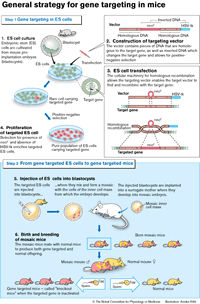Genzyme Genetics Expands Cystic Fibrosis Testing Capabilities
Genzyme genetics announced on October 2 that it is fully prepared to meet the increased demand for cystic fibrosis prenatal screening anticipated to result from the recommendation that all Caucasian women who are pregnant and all Caucasian couples considering pregnancy be offered a genetic test to determine whether they are carriers of the disease. The new guidelines, issued by the American College of Obstetricians and Gynecologists (ACOG), mark the first time that genetic screening has been recommended for such a large population in the United States.
In anticipation of the ACOG recommendation and in response to unprecedented growth in its DNA testing business, Genzyme Genetics has doubled the capacity of its molecular diagnostics laboratory in Framingham, Mass. In addition, it has launched a comprehensive educational program geared toward helping health professionals in obstetrics advance their knowledge of cystic fibrosis (CF) and issues presented by testing.
“We are fully prepared to support physicians in implementing ACOG’s guidelines, which will redefine the standard of prenatal care for the millions of prospective parents across the country,” said Mara Aspinall, president of Genzyme Genetics. “The expanded use of carrier screening for cystic fibrosis will arm parents with more information to make informed reproductive decisions and to enable children born with CF to receive early and appropriate medical intervention. Education and genetic counseling services are critical to the success of population-based screening for cystic fibrosis.”
Cystic fibrosis is the most common serious genetic disease among Caucasians in the United States. The disease results from a defective gene that affects multiple aspects of cellular function. Its most serious symptom is a build-up of thick, sticky mucus in the airways, which can lead to fatal lung infections. Carrier testing for cystic fibrosis is aimed at identifying individuals who do not show signs of the disease, but who carry a genetic mutation that can be passed onto their offspring. More than 10 million Americans are carriers for CF, including 1 in 25 Caucasians. If both parents carry a gene mutation for cystic fibrosis, there is a 25 percent chance that each of their children will be born with the disease. Eighty percent of children born with CF are from families with no known history of the disease.
Carrier screening can help physicians identify children with CF earlier in life, allowing parents and medical professionals to begin medical and nutritional intervention that can improve the child’s growth and development, and reduce the incidence of respiratory infections. Currently, CF is not diagnosed in children until 3.1 years of age on average.
ACOG’s recommendation for testing was preceded by related guidelines issued earlier this year by the American College of Medical Genetics (ACMG). Among other topics, these guidelines described minimum quality assurance standards for laboratories offering cystic fibrosis testing, and underscored the importance of genetic counseling.
Since the CF transmembrane regulator (CFTR) gene was first isolated in 1989, scientists have identified more than 900 mutations associated with cystic fibrosis, most of which are rare. The DNA test offered by Genzyme Genetics screens for 87 cystic fibrosis gene mutations, including the 64 most common mutations and 23 rarer ones. Screening for a larger group of mutations provides a test that is sensitive to the genetic differences among the ethnically diverse U.S. population, according to a study that Genzyme Genetics scientists recently published in Genetics in Medicine. Screening for a larger number of mutations especially helps identify more carriers among Hispanics and African-Americans, the study found.
Other news from the department science

Get the chemical industry in your inbox
By submitting this form you agree that LUMITOS AG will send you the newsletter(s) selected above by email. Your data will not be passed on to third parties. Your data will be stored and processed in accordance with our data protection regulations. LUMITOS may contact you by email for the purpose of advertising or market and opinion surveys. You can revoke your consent at any time without giving reasons to LUMITOS AG, Ernst-Augustin-Str. 2, 12489 Berlin, Germany or by e-mail at revoke@lumitos.com with effect for the future. In addition, each email contains a link to unsubscribe from the corresponding newsletter.



























































